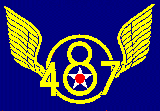 |
|
 |
|---|
487th Bomb Group (H)
Comments of James R. McKinney
Recorded by his son, Scott McKinney
I was in the 487th Bomb Group, 837th Squadron and the navigator on a B-17 named “Queen of Hearts”. The serial number of our airplane was #44-6913. Our home airstrip was at Lavenham, Suffok, UK. On our mission to bomb the Brandenburg Airfield at Briest on April 10, 1945 our ship lagged behind the Squadron when we were attacked by 2 Me262s. We were hit in the #1 engine and it caught fire. Our pilot Ted Sells ordered everyone to bail out. We all bailed our over Celle, Germany and parachuted safely to the ground. The Radio Operator, John Peters, was the last to exit the plane. He was standing at the door when the plane turned on its side and then exploded. The explosion propelled Mr. Peters straight up and he passed by Mr. Sells (descending) in mid-air. We were all captured and taken to Stalag 11A.
On April 10, 1945 the crew members were Edward L. Sell 2nd Lt (Pilot), Benjamin Hauck F/O (Co-Pilot), James R. McKinney 2nd Lt (Navigator), Luther O. Robinson S/Sgt (Flight Engineer), John D. Peters S/Sgt (Radio Operator), Robert I. Brownstein Sgt (Gunner-Ball Turret), John S. Giannini Sgt (Gunner-Tail), and Solomon Snyder Sgt (Gunner-Waist). Also flying with us that day was George D. Phillips (Togglier), who was not a regular crew member. That is why he is not in the crew member’s photograph. The only crew member that did not make the trip was Richard Frankhauser (Bombardier). At that point during the war not all planes within the formation required a Bombardier. The Radio Operator would drop the bombs when the Bombardier from the lead plane would release its bombs.
On April 25, 1945 a team consisting of at least one Officer believed to be a member of SAARF and an OSS radio operator parachuted outside the camp's fence and was captured. The SAARF Officer's mission was to meet with the Camp Commandant, Col. Ochernal and setup communications with Allied Commanders in order to coordinate the eventual release of the camp's prisoners. Shortly after the capture an OSE radio and code book appeared within camp and into my unit. It was a battery operated telegraph unit with headphones. At a certain time every day we would receive a message from England in code. I was assigned to be the code officer. After the message was received it was given to me to decode. If a reply was needed I would code it and the radio operator would transmit it back to England in Morse code. A few days before the trucks came to get us we started getting transmissions that were not coded. They told us the trucks were coming and to get ready.
On May 3, 1945 nearby American troops crossed over the River Elbe and rescued us as the Russians advanced. We were evacuated by getting into the first group of trucks that arrived at the camp. After the trucks were loaded and ready to roll one of the guards standing beside our truck jumped over the side of the truck into the back where we were standing. I was apprehensive about his intentions until he unstrapped his Lugar pistol and handed it to me. He indicated to me in German that the Russians were coming and he was fearful for his life and wanted to go with us to the American Lines.
The trucks had some provisions that they brought to us and we threw them to the Germans as we passed by them gathered along the roadside shouting “Viva Yankee”. After we crossed the Elbe River on an undamaged bridge we reached the American lines. The convoy halted and American soldiers came to each truck and checked the personnel. They took our guard and other guards in other trucks as prisoners. That was the last we saw of the guards.
We were taken to a delousing camp where we removed all our clothes and went through a tent where we were deloused. I think was with DDT. I put the pistol outside the tent and after delousing I snuck back to the entrance and retrieved it. We had to discard everything but our dog tags. In the next tent we were issued new clothing and shoes. We were then trucked to LeHarve, France to await a Liberty Ship to go back to the States. The first few days after we left France the weather was very rough and I became sea sick and went to the ships’ infirmary. On another day the infirmary was full and they kicked us out to hang on the side rail of the ship. After two more days the weather cleared up and I was assigned as the Officer in charge of cleaning up one of the ship’s Latrines. The trip lasted 10 days. We all shouted as we passed the Statue of Liberty in New York Harbor. I had saved a few American coins after exchanging some money in LeHarve. After we docked and unloaded our few possessions I found a dockside phone booth. I called my mother in Ridgewood, NJ and told her I was home.
After unloading we were trucked to Ft. Dix, NJ and given two weeks leave. I was scheduled that upon my return I was re-assigned to report to the Japanese theater to fly. While at home they dropped the atomic bombs and the war was over.